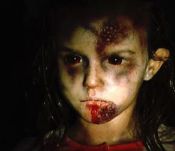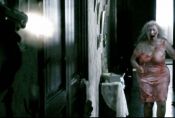
As cult horror hit REC comes out on DVD, Rory Ford asks director Jaume Balagueró to let him in on its secrets. Be warned, this is a film full of surprises, and there are SPOILERS ahead...
Rory Ford: Can you tell us a little about your unique style of collaboration on the direction of the film? I believe you split actors off into groups and told them different things so that they would be genuinely surprised if they were attacked.
Jaume Balagueró: Yes, it's true. We wanted to shoot the movie the most organic and credible way. The actors never got the complete script, just a few pages with the general story. No dialogue at all. That's why we needed to shoot chronologically. They were discovering all the details of the story while we were shooting, reacting spontaneously to all the new events. In some ways, the movie was growing by itself. We needed just to control it.
RF: Did you scare any of the cast?
JB: We shot the last scene in pitch black. Only the cameraman was able to see through the camera with the night vision mode. The actress was totally blind. And they had no idea about the "Niña Medeiros" creature they were going to find. A very strong experience for both of them.
RF: You seem to have had total access to the very posh looking Barcelona apartment building. How on earth did you manage it?
JB: It's an empty building in the centre of Barcelona. No neighbours. Just some empty apartments and a textile workshop. The owner rents the whole building for shooting movies.
RF: Your director of photography "plays" the cameraman in the film but I understand you had another actor dub his lines - why?
JB: Just because he's not an actor. He was forced to play the role of the cameraman, to interact with the other actors and perform emotions like fear and tension while shooting the movie. And he did a great job. But finally, we decided to dub his lines with a professional actor.
RF: I was very impressed by the way your cameraman ran up the stairs to the top floor while being chased by the infected. Did you have any accidents - and are they on the DVD?
JB: Actually, we had a couple of little accidents: the Colombian girl crashing against a window and the fireman falling down the stairs. They are both on the DVD.
RF:REC looks like it cost a few million but I believe it only cost 800,000 euros. How much has it made in Spain?
JB: REC made over eight million euros in Spain.
 RF: I believe you're currently preparing the sequel. Will it be in the same style?
RF: I believe you're currently preparing the sequel. Will it be in the same style?
JB: We can't say anything about the sequel. Not yet.
RF:I was very impressed that you gave a definitive reason for the outbreak - which is both chilling and original. Did you always plan to do this?
JB: For the end of the movie, we wanted an special twist. Not just an "infection" story but something more weird. A demonic possession as the origin of the infection was an insane and disturbing idea that could increase the level of fear and tension at the end of the movie. Especially because it's something totally unexpected.
RF: How involved are you in the American remake? Have you seen it yet?
JB: No. We have not been involved in the remake at all. They just bought the rights to make it and they did it.
RF: Were you happy to turn the remake over to another director?
JB: It's okay. For me, there is no sense in remaking your own movie just a year after the original.
RF: Have you seen Cloverfield and Diary Of The Dead?
JB: Just Cloverfield.
RF: In Britain, REC came out after these films. Do you think this might have spoiled its impact?
JB: Probably. But I think REC has its own personality as a horror experience. I hope so.
RF:Spanish horror movies are much more literary than American or British ones. Was REC the product of a deliberate decision to do something more immediate?
JB: The idea was to tell a classic horror story but using live TV language. Using this live report style, we wanted to reach a higher level of realism and credibility in order to increase the implication of the audience and fear. We like to perceive REC like a film not just to be seen, but to be experienced.
RF:You both started out directing adaptations of Ramsey Campbell novels. What attracted you to them?
JB: When I read The Nameless I was deeply shocked by the intrigue of the plot and the scary use of the atmosphere. I love the way Ramsey Campbell handles the suspense and the atmosphere to create a very personal kind of horror.
RF: Did you get any feedback from Mr Campbell?
JB: Yes, of course. Mr Campbell came to Spain for the premiere of the The Nameless at Sitges Film Festival. He was very happy with the film.
RF: Are there any other novels you would love to turn into films?
JB: Lots of them. I'm working on the adaptation of a Spanish novel: La Dama Número Trece (The 13th lady) by Jose Carlos Somoza.
RF: You've both directed English language films. Did you find it hard? Are you more at home working with Spanish actors and dialogue? Would either of you like to do it again?
JB: Of course it's easier for me to direct in Spanish, but it's no big deal to do it in English. I'll do it again if the project needs it.
RF: Have either of you had offers from Hollywood?
JB: Yes, some of them.
RF: You had the original idea for La Nonje (The Nun) but didn't direct it - why?
JB: Brian Yuzna ask me for an idea about an evil nun, some kind of ghost story involving a nun. I wrote some lines about it, a ghost story with teen girls, an old school and a nun. But I was not involved in the later development of the movie.
RF: I thoroughly enjoyed your films for 6 Films To Keep You Awake. Many British cinema films fall far below the quality of that series. Did you enjoy doing TV and would you do it again?
JB: I loved the experience of making a little horror movie without pressure and with total freedom. And, of course, I would do it again.
RF: Horror movies of all kinds seem to be very popular in Spain. Why do you think that is?
JB: Actually, I think horror movies are not especially popular in Spain. I believe that the great success of REC and The Orphanage last year was just a coincidence.
RF: I believe Spain is now making the finest horror movies in the world now? Do you agree and are there any ones (old or new) which we should look out for?
JB: The same impression you have about Spanish horror movies, we have about English or French new horror wave.
RF: What movies and directors do you both like?
JB: It's very difficult for me to choose just a few. Lynch, Cronenberg, Robert Mulligan's The Other, The Haunting Of Julia, Hellraiser, Rosemary's Baby, George A. Romero, Alien. Out of the horror genre, I love Wim Wenders, Spielberg, Bertrand Tavernier, Kieslowsky.





















